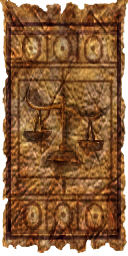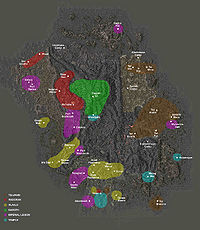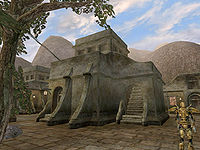- Como resultado de sua relação próxima com a administração Imperial, a Casa Hlaalu emergiu como dominante tanto política e economicamente dentre as Grandes Casas de Vvardenfell e Morrowind. Hlaalu recebeu bem a cultura e leis Imperiais, Legiões Imperiais e burocracia, e a liberdade Imperial de comércio e religião. Hlaalu ainda honra os antigos caminhos Dunmer -- os ancestrais, o Templo, e as casas nobres -- mas se adaptou ao passo rápido da mudança e progresso nas províncias Imperiais. — Grandes Casas de Morrowind
Casa Hlaalu era uma das cinco Grandes Casas tradicionais dos Dunmer. Ela governava o Distrito Hlaalu do centro-oeste de Morrowind de sau antiga capital de Narsis. No Distrito de Vvardenfell, o conselho da casa era localizado em Balmora, com outras cidades Hlaalu em Suran, Hla Oad e Gnaar Mok. Casa Hlaalu poderia ser caracterizada como adaptável e oportunista, e qualquer moral que eles possuissem eram segundas a negócios. No início da Quarta Era, logo após o Império liberar Morrowind, um sentimento anti-Imperial e a associação da Casa Hlaalu com eles dentre os Dunmer levou a extirpação de sua posição como uma Grande Casa, e a Casa Hlaalu foi removida do Conselho Maior de Morrowind. sua posição no conselho foi preenchido pela Casa Sadras.
A Casa era altamente preocupada com negócios e diplomacia, procurando fortificar seus laços com aliados às vezes inconvencionais tais como o Império, e apesar do lucro ser frequentemente o objetivo primário, a prática Hlaalu tradicional reconhecia de uma boa reputação sobre o do dinheiro. Isso wera sua grande força - eles eram oradores rápidos e comerciantes inteligentes - e sua grande deficiência; muitos Hlaalu eram subornáveis, fosse com ouro ou com outros favores, com seus líderes sem ser exceção. Partidários da Casa Hlaalu eram mestres de ladroagem, furtividade, arrombamento, tráfico e apunhaladas, tanto literais quanto metafóricas. Enquanto alguns conselheiros eram honestos e justos, outros eram mais dissimulados e corruptos. Contudo, a característica mais distinguido da Casa Hlaalu era sua voluntariedade em viver em harmonia com as outras raças, diferente das outras, ocasionalmente xenofóbicas, Grandes Casas Dunmer.
- In the great wind of progress, tradition cannot stand. Grasp fortune by the forelocks. When you see your chances, seize them. When you see a chance to turn a profit, take it. But do not follow money blindly. There is value in reputation, more than many young Hlaalu realize. This value must be carefully balanced against the more tangible coins in any deal. Theft and murder are bad for business. You can steal from someone, but will he trade with you after that? You can't bargain with a dead man. — Grasping Fortune
Hlaalu public buildings — tradehouses and craft guilds, manors and council halls — were designed as simple multi-storied buildings roughly rectangular in plan, featuring arched entrance-ways and modest decorated exteriors. More modest one-story private dwellings followed the same plan, except with less decoration. Hlaalu plantation estates resembled Temple compounds, with walled precincts enclosing outbuildings for craftsmen and servants, dominated by a grand manor residence in place of a Temple shrine.
Friends of the Empire
Historically, House Hlaalu was rather insignificant in the set ways of Tribunal-ruled, pre-Imperial Morrowind. Its holdings were centered around the ancient capital of Narsis in the southern-central region of Morrowind, on the fertile Deshaan plain. House Hlaalu's influence and wealth changed rather dramatically after the Treaty of the Armistice was signed at the end of the Second Era.
During the Tiber Wars, which led to the foundation of the Third Empire, House Hlaalu was alone among the Dunmer Great Houses in proposing accommodation to the massing Imperial legions rather than resistance. After the Armistice was signed, the ruling Lord High Councilor of Morrowind, a member of House Indoril who refused to accept the treaty, was assassinated, and replaced by a Hlaalu noble. Furthermore, the role of the figurehead Sovereign of Morrowind was also filled by a Hlaalu; first Queen Barenziah, and followed, after her abdication during the Imperial Simulacrum, by her uncle King Athyn Llethan. After Llethan's death, the ambitious and ruthless Prince Hlaalu Helseth of Wayrest took the throne.
When previously Temple-owned land on Vvardenfell was opened up for exploration and settlement in 3E 414, Hlaalu managed to grab the lion's share of the best lands in the fertile Ascadian Isles, and also got awarded the charter to the rich ebony mines in Caldera. Vedam Dren, another well-known Hlaalu noble, was the Duke of the Imperial District of Vvardenfell at the end of the Third Era. House Hlaalu was, on the surface, the most in favor of the Empire of all Great Houses, with allies in all the Imperial trade guilds.
These titles and close connections to the Empire and the East Empire Company didn't stop members of House Hlaalu from being involved in the smuggling and slavery business. Several key figures within the House held close ties to local criminal organization the Camonna Tong; the Camonna Tong's kingpin Orvas Dren was the brother of Duke Vedam Dren, and Orvas directly controlled two Councilors. While Vedam disapproved of his brother's activities he was largely powerless or unmotivated to stop them. Of course, the majority of Hlaalu members were unaware of the connection between their House and the Camonna Tong, and indeed hated and feared the syndicate - for the majority believed they were doing quite well from their trade with the Empire.
Externally, House Hlaalu was strongly opposed to slavery, a stance likely encouraged by its relation with the Empire. Despite this, because Morrowind was exempt from anti-slavery laws dating back to the Armistice with Tiber Septim, House Hlaalu used slaves on their plantations; the Camonna Tong also dealt in slaves via connections to House Dres. The Telvanni, however, had a generally low opinion of House Hlaalu, preferring Redoran's spirit and courage over Hlaalu's profit hunger and at times morally questionably dealings. However, despite Hlaalu's utilization of slavery, Ilmeni Dren, the daughter of Duke Vedam Dren, was not just an abolitionist, but a leader within the Twin Lamps movement. During the rise to power of the Grandmaster of the Vvardenfell House Hlaalu, the Cammona Tong were absorbed and eventually diminished by the new Grandmaster due to efforts aided by Duke Vedam Dren. Within the following four years, King Helseth formed an alliance with House Dres and renounced the slave trade entirely.
Among the Great Houses, the Hlaalu were also the most friendly towards foreigners, outlanders and non-Dunmer in general. In fact, during the late Third Era, they were the only Great House to have non-Dunmer on their council: senior positions were occupied by two humans, the Imperial Crassius Curio and the Nord Yngling Half-Troll.
Crisis for the Hlaalu
- Their collaboration with the Empire may have given them unrivaled political and economic strength, but their hearts weren't with the Dunmer people. - Adril Arano
House Hlaalu seemed to be on the rise, however the advent of the Oblivion Crisis in 3E 433 set events in motion that would see the downfall of the Great House. The Empire pulled a vast majority of the Legions out of Morrowind to deal with the gates opening in their homeland of Cyrodiil. The Dunmer had no standing army at the time, and were left defenseless as the armies of daedra swept across the province. While House Telvanni were able to close some of the Oblivion Gates, and House Redoran succeeded in creating an army, House Hlaalu was left powerless without the backing of the Empire. The events of the Red Year, 4E 5, brought further destruction to Morrowind as all of the settlements on Vvardenfell were obliterated. Shortly after the eruption of Red Mountain, Morrowind came under siege from the Argonians of Black Marsh, again being saved by the army led by House Redoran. House Hlaalu, due to their close ties with the Imperial administration, became the scapegoat for all of the Dunmer people's suffering. As a result, Hlaalu was unceremoniously stripped of its Great House status and dismissed from the Morrowind Grand Council. House Redoran became the eminent power in Morrowind, taking the position that Hlaalu had held throughout the Third Era. Hlaalu believe that Redoran were instrumental in the reorganization of the council, and have held a grudge ever since.
In 4E 95, the Redoran Guard uncovered a Hlaalu plot to assassinate the Redoran councilor of Raven Rock. This town, and the island of Solstheim, were given to the Dunmer by the High King of Skyrim in 4E 16 as a refuge following the events of the Red Year. The coup was an attempt by Hlaalu to claim Solstheim from House Redoran, and to send a message to the Council that their new leaders were not as mighty as they purported to be. However, the conspirators were executed and the coup was quelled.



